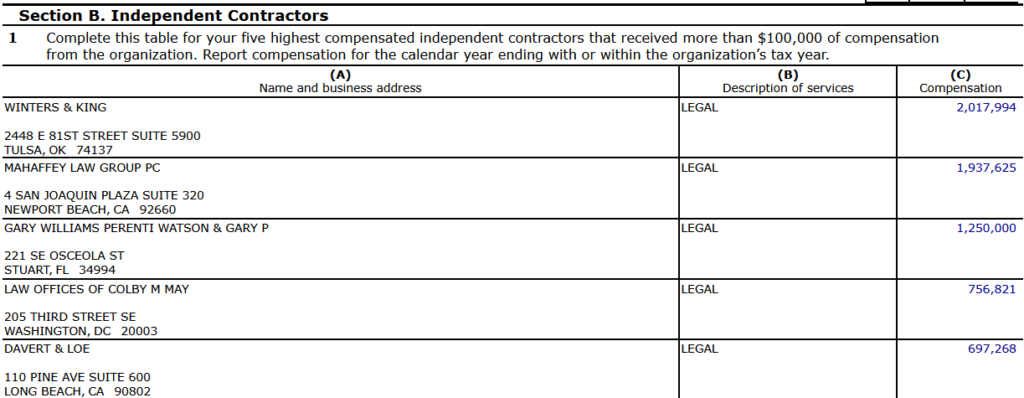
Covering Courtroom Scandals
Where were the religion reporters when televangelist Robert Tilton’s corrupt attorney J.C. Joyce delivered an aggressive defense of religious fraud?
Joyce told the court, “The right to believe what we choose to believe is absolute. We even have the right to defraud people with that belief.”
On March 21, 1995, Attorney Gary Richardson reminded a court of Joyce’s prior defense of fraud.
Tragically, that quote has not been reported in any newspapers.
Corrupt attorneys have played a primary role in aiding fraud and coverups in churches and ministries, but their actions rarely receive critical news coverage.
Meanwhile, televangelists have generated massive legal bills which most donors know nothing about. Court reporters should spotlight these legal expenses for religious non-profits filing Form 990s.
The Court Beat
Large newspapers assign reporters to cover specific topics known as beats. Some of the better-known beats are education, city government, local sports and courts.
In 2012, Orange County Register newspaper reporter Teri Sforza repeatedly embarrassed TBN Trinity Broadcasting Network (TBN) by writing news stories prompted by lawsuits filed in California by Brittany and Carra Crouch, granddaughters of the founders of TBN.
The religious broadcaster attempted to silence Sforza and the Orange County Register with a contempt order alleging a document cited in a news report was either stolen or leaked by an attorney to the newspaper.
TBN’s court motion complained, “No reporter randomly checks filings unless tipped off.” Sforza responded in an article, “Every court reporter in America would tell Trinity that the job does, indeed, include randomly checking court filings. Every. Single. Day.”
Due to the lack of courthouse beat reporters in the religious news media, litigation involving religious non-profit organizations often goes under-reported.
For example, in March 2025, Kelly Allen and Christopher Thompson filed a class action lawsuit against Trinity Broadcasting Network (TBN), accusing the religious broadcaster of sharing “personally identifiable information” with Meta Platforms, Inc., the parent company of Facebook and Instagram.
With the exception of a Bloomberg Law news report, the class action case has received almost no media attention.
Trinity Foundation was unable to find a single full-time court reporter when reviewing the magazine mastheads for Christian news publications and staff pages of religious news websites.
Solutions
Media organizations face the perplexing questions: How much would a court reporter cost and how do we fund this position?
The budget for such a job should include salary, subscriptions to legal databases, and travel expenses so the journalist can attend court hearings.
Crowd funding could raise the money necessary to pay the salary of a court reporter. A non-profit organization or wealthy philanthropist could provide a cash grant to fund such a position.
Religious non-profit journalism organizations such as Christianity Today, MinistryWatch, Religion News Service, The Roys Report, Trinity Foundation or World Magazine would benefit greatly from having a court reporter.
Christian Post, a for-profit media company, could use corporate sponsorship to fund a court reporter.
Another possibility: Funding an endowment at a Christian college or university to create a chair for court reporting and encouraging collaboration between the journalism and law departments.
America University Magazine explains, “Endowed chairs are faculty positions permanently funded by an endowed gift that support faculty in their research and create a knowledge environment that benefits our students and communities.”
A chaired university professor could also oversee research into church abuse and the application of case law to church and ministry fraud.
Expertise Required
Because many courts prohibit audio/video recording, court journalists must be very fast writers while understanding legal concepts.
UK news site The Conversation reports, “Ideally, court reporters can write at least 100 words a minute shorthand (we speak at around 150 words a minute during normal conversation).”
According to a National Council for the Training of Journalists report, “The lack of journalists with good shorthand is thought to be a contributory factor in the shortage of dedicated court reporters, and indeed of general reporters who are sufficiently competent to be assigned to coverage of the courts.”
National court reporters must also be able to navigate the numerous court systems: city, county, state and federal.
In April, the Jeremiah Counsel Corporation filed a lawsuit against Second Baptist Church in Houston to force the church to return to its previous bylaws or require the church to hold a new vote on church bylaws only after providing a copy of the proposed bylaws to church members.
The new bylaws, which eliminated church member voting rights, were adopted without informed consent. Church members were unable to view the bylaws before the previous vote was held.
Recently, church attorney Jay Sekulow filed a court petition requiring the Second Baptist Church case be moved from Harris County 55th District Court to the Business Court of Texas, Eleventh Division.
The Jeremiah Counsel opposed the court jurisdiction change with a new filing citing a recent Texas Supreme Court decision which “shows that the Individual Defendants’ jurisdictional arguments are meritless. Their efforts to block discovery with baseless jurisdictional arguments should be rejected out of hand.”
Investigative Skills
The best court reporters have natural curiosity and the ability to perform investigative reporting.
A current case that deserves the scrutiny of a court reporter is Dr. Phil’s lawsuit filed against TBN. TV show host Dr. Phil alleges that TBN failed to meet its financial obligations in a recent lawsuit and Chapter 11 bankruptcy filing.

(Screenshot: Dr Phil appearing on Merit TV in 2024.)
Dr. Phil and TBN created the joint venture company Merit Street Media, Inc., in 2023 as part of a production/distribution deal for new TV shows featuring Dr. Phil.
When the partnership was announced in 2023, it received little criticism from Christian media. Susan Puzio’s Prophetic News was the exception for reporting on Dr. Phil featuring a psychic reading on his TV program.
Merit Street Media alleges that TBN withheld TV distribution payments and failed to properly promote the TV programs.
Also, according to the lawsuit, “TBN transferred its obligations to Merit Street causing it to pay or incur obligations to third parties in excess of $100 million—obligations that are the responsibility of TBN, not Merit Street.”
Numerous questions arise when reviewing the case documents.
A motion filed on the same day as the lawsuit reported, “The Debtor anticipates there will be approximately 763 notice parties in this chapter 11 case.”
Because TBN is the defendant, it will face most of the accusations, but Dr. Phil and Merit Street Media also deserve critical attention.
A subsequent filing listed the names of many creditors Merit Street Media owes money to. One of the companies is Silencer Shop which sells gun suppressors and guns.
Did Merit Street Media purchase gun silencers? Was this an appropriate expense or was Merit Street Media wasting money? Should TBN reimburse the purchase of a gun silencer or gun?
Dr. Phil’s lawsuit against TBN also reveals new corporation names which an investigative reporter should further explore such as CrossSeed, Inc., which was incorporated in 2024 with TBN president Matthew Crouch serving as an officer.
What is the purpose of the non-profit organization CrossSeed? Is this non-profit operating in a self-dealing manner? In other words, does the organization exist to transfer assets to TBN management?
Following the Money Trail
Merit Street Media’s lawsuit suggests it “may require a forensic accounting audit.”
If a forensic audit is approved by the court during the discovery process, additional questionable financial transactions could be disclosed in future amended complaints.
Copies of bank statements and receipts could be made public and obtained by court reporters.
Trinity Foundation has filed twice as an intervenor and successfully unsealed financial documents from both Daystar Television Network and Paula White.
Dr. Phil’s TV program on TBN did not have a religious purpose. Therefore, the revenue from the TV series should be treated as unrelated business income.
Will any revenue be reported on a non-profit Form 990 tax return or will TBN report the TV production as an operating loss?
As the Merit Street Media lawsuits move through the courts, more of the business relationship between Dr. Phil and TBN will be disclosed.
So far, court documents from the proceedings have not reported that TBN’s Bombardier Global Express jet was transferred or sold to Dr. Phil’s company Global Express Media 25 LLC in 2025.

(Photo: In 2020, Trinity Foundation investigator Pete Evans photographed TBN’s Bombardier Global Express jet at Fort Worth Alliance Airport.)
The Cost of Church and Ministry Litigation
In September 1991, a Louisiana jury found televangelist Jimmy Swaggart guilty of slandering former Assemblies of God pastor Marvin Gorman and awarded Gorman $10 million.
In her book Swaggart: The Unauthorized Biography of an American Evangelist, author Ann Seaman describes the trial, “Jury selection took a week. Twenty-four attorneys represented Jimmy and his co-defendants, Gorman and various insurance companies.”
Swaggart would appeal the $10 million award in a long court battle. Several years later Swaggart and Gorman agreed to an out-of-court settlement requiring Swaggart to pay $1.8 million.
Legal costs for churches are often difficult to obtain. Churches are not required to file the non-profit Form 990 informational return, and many churches refuse to provide comprehensive annual financial statements to their members.
TBN, the world’s largest religious TV network, claims to be a church and voluntarily files 990s with the IRS. From 2012 through 2019, Trinity Christian Center of Santa Ana, the parent organization of TBN, disclosed $32.6 million in legal expenses on 990s while the network was engaged in two very expensive legal battles involving Brittany and Carra Crouch.
Speaking about his daughter Carra’s court battle, former TBN executive Paul Crouch Jr. says, “I know TBN spent probably 10 or 20 million dollars trying to defame her, trying to call her a liar …”
Before TBN stopped disclosing settlement expenses as a line item in the 990s, the broadcast ministry spent more than $40 million on court settlement expenses.
In 2019, California’s Fourth Circuit Appeals ruled in favor of Carra Crouch. The court originally awarded Carra $3 million, but on appeal TBN was required to only pay Carra $900,000. This court judgment is likely listed on a 990 in the line “All other expenses.”

Attorneys for non-profits are typically paid as independent contractors, and their compensation is also listed in the 990s. In 2014, the law firm Winters & King received $2 million from TBN.

Conclusion
Court reporting is found in the Bible with references to Jesus Christ’s appearances before the Sanhedrin court and Pontius Pilate.
During examination, Pontius Pilate the Roman governor asks Jesus, “Are you the king of the Jews?”
When Stephen the Deacon testified before the Sanhedrin, the high priest asked him, “Are these charges true?” Acts 7 provides a long quote of Stephen’s testimony.
Biblical court reporting captures stories of human rebellion and God’s redemptive plan at work.
Journalists should carry on this important tradition.
